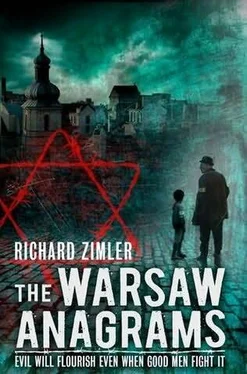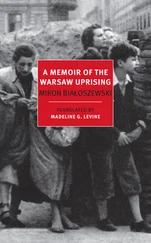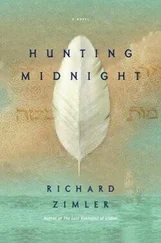When he was on one of his binges, cannibalism seemed a real possibility. Liza and I kept our distance and advised Noc to do the same.
His scurvy proved no match for his boundless appetite.
In the silence of the forest protecting our farm, I began to believe that as long as there were women like Liza in the world, Jewish history could never come to an end – not here or anywhere else. And that sooner or later, the world would come to its senses.
Liza sold her bowls, mugs and vases at two shops in Puławy. The owners came once a month to pick out the merchandise they wanted. Jerzy, one of them, selected a Japanese-looking bowl of Izzy’s one day – blue, with calligraphic black strokes near the rim. His first sale. We celebrated with wine that evening.
At night, in bed, Izzy and I would talk about the friends we’d left back in Warsaw. It always seemed strange to us how geography can determine everything during a war. I wondered if I would ever see the city again. And if I’d want to.
In the early hours of the morning, I’d sometimes hear my name being called, as though from downstairs, and I’d try to get out of bed, certain that Liza was in trouble, but I’d find – to my horror – that I was unable to move. My arms and legs were paralysed. Never had I known such helplessness. And then I’d see Izzy’s face lit with crescents of light and dark by the white candle in his hand, and hear him whisper my name, and I’d realize he was waking me again from the nightmare that was being sent to me by all that I’d failed to do.
Twice a week, a stocky labourer and his teenaged son came from Niecierz to work Liza’s land; she had an agreement with them that allowed her to keep half of her fruit and grain. Izzy and I would hide in the cellar whenever we heard their donkey cart rambling down the potholed dirt road that skirted our farmhouse, reading by candlelight until Liza sounded the all-clear, which was a high whistle that would make Noc race up the staircase and bound into her arms.
I started fishing in the early evening in late May, on a quiet bend in the River Wisłoka guarded by dense, leafy woodland – mostly paper-barked birches and tall, broad oaks, but also curlicue-branched hazel bushes near the water. Noc would tag along, his tail twirling. He’d try in vain to catch dragonflies in his snapping jaws and watch the dark water around my line as if expecting a river sprite to surface at any moment.
On two occasions, I caught trout big enough to eat.
Izzy and Liza planted a kitchen garden, so that by early June we were able to begin harvesting fresh vegetables. The sweet, earthy smell of our beets carried me back to the days of my childhood when I’d go marketing with my mother. Liza, on sniffing at our perfumed trellis of pink and blue sweet-pea blossoms, would always fake a swoon, like the heroine of a nineteenth-century novel overcome by love.
Food had never tasted so good as the meals we ate on Liza’s small patio, listening to the Polish trees and fields speaking in the language of wind from the Ukraine. But no matter how much I ate, crabs of hunger would still sometimes scuttle through my belly during the night. I’d light a candle and creak down the stairs into the kitchen. Often, Izzy would accompany me. We’d sit in our underwear at the kitchen table – little kids gorging on cheese and pastry while their parents lay sleeping.
One warm dawn in late June, I took off all my clothes and lay next to Noc in a potato field. The ground seemed solid below me – incapable of giving way – for the first time in a year.
Izzy and I were in the cellar on 7 July, helping Liza stack her freshly fired pottery on her shelves, when we heard two cars approaching. By now, we knew the routine. We crept behind the kiln, out of view. She rushed upstairs and closed the cellar door behind her. Two men soon entered through the front door, and Liza began talking German, but we couldn’t make out her words.
After a few seconds, she shouted, ‘Get out of my house!’
I listened for a gunshot. Instead, a German yelled, ‘Where are you hiding him?’
Him … I understood the significance of that right away; whoever had denounced us to the Nazis had only spotted one of us.
When Liza screamed, I jumped up.
‘Stay here!’ I whispered to Izzy.
‘Where are you going?’ he demanded, gripping my arm.
There was no time to explain. I leaned down. ‘Go to Louis when you get out of here.’
When I kissed him on the lips, he held me for a startled moment, then kissed me back.
‘Erik, no!’ he whispered desperately as I stepped away.
I meant to say with my eyes that our time was over, and I meant my smile to mean that I had no other choice. Did he understand?
When the cellar door opened, I started up the stairs with my hands extended high over my head.
‘I’m coming up!’ I called out in German. I didn’t dare glance at Izzy, because I was sure that his darkly shadowed eyes – and everything in them that I wanted to live for – might steal my courage, though I wished I could have reassured him that I’d be all right.
Three SS officers had come to the farm. Though I put up no resistance, the two younger ones knocked me down and kicked me. Liza stood by, shouting curses at them, until the one in command – forty-ish, with greying hair around his temples and black eyebrows – grabbed her and threw her to the ground.
‘I didn’t tell them!’ she shouted to me as I was dragged away. ‘I swear!’
The Germans shoved me into the back seat of their car.
Before I was able to holler out the window that I knew she could never betray us, the older Nazi raised his gun and fired. Liza fell over with a guttural cry, clutching her arm.
I shoved open my door and got out. ‘Stop!’ I shouted at him. ‘She only hid me to make money!’
He never even turned to me. He put the barrel of the gun up to Liza’s ear.
She showed him a bewildered look.
I can still hear the explosion of the bullet; it’s the sound of all the best people I ever knew being murdered.
The German in command got in the back seat beside me, demanding to know my name and where I was from. He slapped me across the face when I made no reply. Struggling for breath, I told him my name was Izydor Nowak and that I was a clockmaker from Warsaw; I appropriated my old friend’s identity because he’d be able to disappear more completely if the Nazis believed that they had captured him already.
I also told him that he had murdered a wonderful woman who had not deserved to die.
I next remember entering Puławy, where my captors made me stand in a town square with a group of about fifty other Jewish men for the rest of that day and all through the night. The Christian residents – thousands of them, it seemed to me – passed us on their way home from work, but none of them offered us a crust of bread or a cup of water. The Germans wanted to prove to us, I think, that we were nothing – less important to our Polish neighbours than dogshit on the sidewalk. And it was true.
By the time morning came, I was unable to escape my misery even for a moment. My throat felt as though it had been blasted with sand, and I was having trouble breathing. I had no more tears left.
Polish and German soldiers soon marched us off. To where, we had no idea. My good fortune was that exhaustion and dehydration made me delirious. Puławy was substituted by Warsaw, and I was rushing down Leszno Street. The dome of the Great Synagogue was rising into a sunlit sky just ahead, imposing, but like a grandfather only pretending to be stern, and summer rain had begun to fall, and its hammering against the dome was a good sound, the sound of life being born…
I stayed in Warsaw until a gunshot tugged me back to myself. A man in front of me had collapsed and been executed. Flies were already feeding at the wound in his head. We were walking down the platform of a small train station.
Читать дальше












